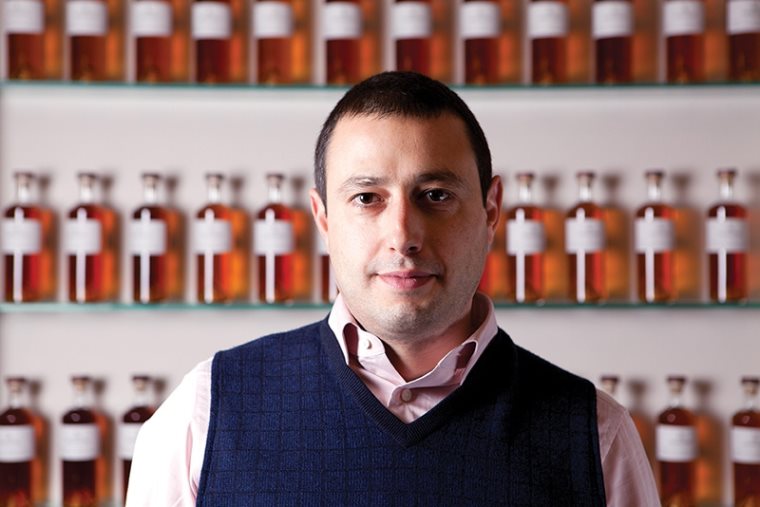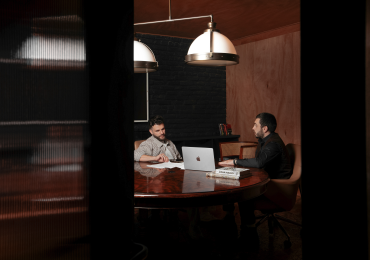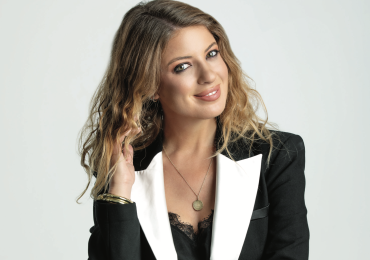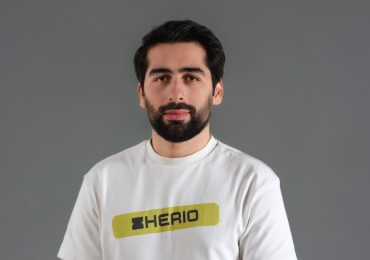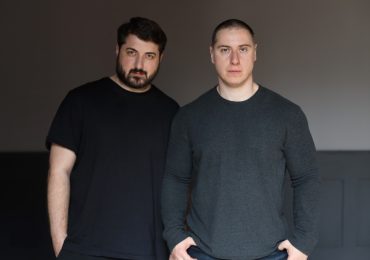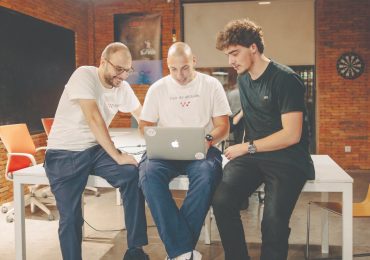Zura Bubuteishvili took over the management of Sarajishvili, the century-old wine brandy manufacturing company during one of Georgia’s most economically difficult times. It was 2006, and the industry had been destroyed by Russia’s embargo, and Sarajishvili’s sales had fallen by 70%.However, thanks to several bold decisions, the diversification of the company’s international market, and new creative strategies, the company is much stronger now than it was even before the embargo.
Something unbelievable happened to me. I found myself in heaven! I looked straight into the eye of time and breathed in an angel’s share of alcohol vapor. No, don’t you worry, I’m all right. I haven’t lost my mind, and I still stand with both my feet firmly planted on the fertile ground of our country. But, please, don’t think that I am exaggerating anything.
And before I am rightfully criticized for my insolence, let me make it all completely clear to you: I am not talking about the heaven where the privilege of access is granted to only those who can subdue their earthly passions. Quite the contrary. The heaven where I found myself welcomes especially those who are fond of the inebriating aroma of earthly passions and maybe are even the creators of this aroma. That is what they call the place where cognac houses with rich traditions store their very old and very precious spirits –Heaven or le Paradis.
34-year-old Zura Bubuteishvili walks between the rows of oak barrels vigorously, but at the same time very carefully, as if he were trying not to wake somebody up. Working for Sarajishvili is not just a regular job for Bubuteishvili –it is his ancestral house as well (his family lives in a top-floor apartment in one of the four-story buildings of the winery. The first three floors are occupied by the offices of the company). However, the moment he steps into this ‘heaven’, his voice becomes lower and his steps become lighter. He might be the boss to other employees, but as we approach the barrels with dormant spirits that have been brewing for 40, 50 and 70 years, Zura Bubuteishvili immediately transforms into a humble subordinate of something greater than himself. This sudden transformation of the executive director reminded me of a famous business truism:
‘A manager manages business, while a true leader leads and serves’.
The meaning of this expression became particularly obvious while we stood among the barrels that were at least twice as old as the people there. It could not be otherwise, since Sarajishvili is not just a business, it’s history. Certainly Forbes Georgia is not the first to write about the company, the founder of which – businessman and philanthropist David Sarajishvili – would certainly deserve to be among the world’s richest people, since the current estimate of his capital is now estimated at over $1 billion USD.
In 1887, David Sarajishvili opened his first factory in Tbilisi – the first brandy factory of its kind in the Russian empire. The factory used only local raw materials in its production. After the subtle aroma of Sarajishvili cognac reached the Imperial Palace, the network started to expand throughout the entire Russian empire. In fact, there is one legend that still exists in the world of Western brandy lovers. When the Bolsheviks seized the Winter Palace in St. Petersburg in 1917, the revolution took a week-long hiatus, that’s because the rebels got hooked on the emperor’s cognac collection.
In order to avoid any misunderstanding with the experts in this sphere, let me clarify that Sarajishvili is not a cognac in its classical meaning. The technology of making it is absolutely classical. But as many probably know, the French can sometimes have an arrogant nature about them. As such, it is unlikely they would ever pass up the chance to demonstrate their uniqueness – particularly when it comes to alcoholic beverages. Therefore, the legal status of cognac does not permit anyone use this name unless the brandy is actually made from grapes grown in the surrounding area of the town Cognac. Therefore, Sarajishvili is sold under the name brandy and not cognac, despite the fact that David Sarajishvili, who received his education in St. Petersburg, Munich, Heidelberg, Hohenheim, Halle and finally, the School of Viticulture in France, presented a scientifically-proven argument that some Georgian grape varieties grown in the relevant climate and soil have very similar characteristics to the grapes that are used for making cognac spirits.
So, then why is Sarajishvili still a brandy and not a cognac? Georgia’s geographic location, its natural climatic and soil characteristics, its indigenous grape varieties and centuries-old tradition of winemaking, all meet the necessary conditions for making the highest quality cognac – especially when talking about such a historic brand likeSarajishviliBut as the French would say: A tout pourquoi il y a parce que– every why has a wherefore.
Ultimately, it turns out that the only obstacle for the Sarajishvili brand on the international market in terms of its competitiveness, is not that there is anything wrong with the taste of the cognac, but the fact that Sarajishvili does not have the right to use the word cognac.
“We have the same value. However we cannot price it appropriately because of the name. We have to categorize our product as brandy,” laments Bubuteishvili. I can’t say that this is bad news for lovers of good cognac. We can enjoy the equivalent of the world’s most exquisite cognac brands for a lower price. But that does not mean we should not give Sarajishvili the respect it deserves – on the contrary. So, my friends, I hope the French will forgive me if in this article I refer to Sarajishvili as cognac, the name that is associated with elegance, luxury, refinement and sophistication.
As we have already mentioned in the previous issue of Forbes, this old Georgian brand, which has always been exceptionally innovative, has taken the same path as the country itself. Sarajishvili’s trademark – the mountain goat –is one of the oldest logos in the world. The century-old advertising banner, which depicts an aristocrat with a bottle of cognac in his hand, is one of the first examples of the concept that espouses providing consumers the ‘face of an advertising campaign’, and the parallels are obvious. The company, not unlike the country, was appropriated by the Russian Empire, and was restlessly striving to introduce itself to the rest of the world.
To a certain extent, Sarajishvili didmanage to introduce its brand to the world. From 1889-1912, Sarajishvili cognac was awarded gold medals at international competitions in Paris, Brussels, and Chicago. Soon after, Sarajishvili was closed behind Soviet borders and renamed the Tbilisi Cognac Factory. Sarajishvili was in the hands of various professionals, who led the technological processes and created unique reserves of the spirit. All the while, the factory remained true to its traditions. Finally, in 1994, along with Georgia’s independence, Sarajishvili was transferred into private ownership, regained its name, and began to enrich the culture that it had established decades before.
“The communists removed the Sarajishvili name from the cognac,” says Bubuteishvili. “But it’s been just over 20 years since Georgia became independent. It is a very short time to secure a place in the industry and to make the Sarajishvili brand as popular as it should be. I’m sure that if it hadn’t been for such a long gap, Sarajishvili would be more famous right now,” he added.
Zura Bubuteishvili’s background is linked to Sarajishvili just as close as Sarajishvili’s history is linked to the history of the country. Perhaps this explains why he barely ever speaks about his life beyond the company. He mentioned that he has a wife and a 17-year-old daughter, but the only other personal information I could pull out of him was that he is fond of water skiing and has his own boat on the Tbilisi Sea.
“I spend most of the day at work, and when I manage to get a break from work, I go water skiing,” he said matter-of-factly. There is one other extraordinary fact about Bubuteishvili: he is an Honorary Consul of Croatia. “But I will tell you how this happened a little bit later, when we finish talking about Sarajishvili,”he told me.
Unfortunately I forgot all about it. I have to confess that I did not insist on him telling me the rest of the story either. But, please, don’t judge me. I have a good excuse for that. By the end of my interview I was so befuddled by the breathtaking aroma (as well as the privilege of tasting it) of the 122 year-old cognac that was made by David Sarajishvili himself, that I could barely remember my name, not to mention Bubuteishvili’s promise to finish the story of how he became the Honorary Consul of Croatia. I hope that you will forgive my negligence, provided that I try to describe the stunning taste that still lingers on my lips and strives to reach out to you, because it is in the nature of this cognac, which is all-embracing, almighty, fervent and sweet, like love without boundaries. Only the loud echo of our whisper can tell the depth of this feeling. Not everyone is destined to relish the taste of bulletproof happiness, and if anyone can snatch it from the thrifty hand of fate – even for a minute or even for a moment –he can say that he has lived a full life. I get completely overwhelmed by a velvety blissful feeling every time I remember it.
But I digress.
The price for one bottle of its coupageis $10-15 thousand. No wonder I forgot about Croatia. Therefore, it’s best if I stop here and go back to Zura Bubuteishvili who continues to guide me in the ‘paradise’. There are glass containers with exclusively old liquids beyond the rows of oak barrels. Some of them are more than a century old. They are too old to be left in oak barrels. Unlike this heaven that people hope to get to after death, Sarajishvili’s le Paradis is a place where cognacs await their birth.
Under the constant care and supervision of Sarajishvili’s old technologists – the oldest has been pushing barrels in the vast wings of the factory for 51 years and the chief technologists has been serving Sarajishvili for 30 years. After all, young spirits have to wait for decades before turning into glorified beverages. Sadly, 3% of these spirits evaporate every year. Therefore the storage facilities are always soaked in the subtle aroma, particularly on Mondays, since the cellar door is locked on weekends. As usual, the French came up with a very poetic name for this vapor: ‘the angel’s share’. Obviously, angels like this drink. Come to think of it, cognac producers spend lots of money to quench the angels’ thirst – the price of tens of thousands of bottles’ worth of precious spirits every year. What else can they do? Angels bestow cognac with their main ingredient – time.
One could say that Bubuteishvili spent his early years in the company of the cognac-loving angels. After its privatization, Sarajishvili went into the ownership of Zura’s father Elguja Bubuteishvili. The director general of Sarajishvili is a public servant by trade. He studied public administration at the technical university, and in 1998, upon his graduation, Bubuteishvili joined his father’s business.
“I was 18 when I started working. I did not have an official position, I was just helping my father. Afterwards, I worked in almost every capacity – sales, marketing, on the supervisory board, the board of directors, and finally, in 2006 I took over the management of the company,” notes Bubuteishvili.
Remarkably, the company started rebranding the same year (2006) Zura Bubuteishvili took over the management of Sarajishvili. The company cut back on secondary brands, such as Eniseli, Vartsikhe and Gremi. These names corresponded with the winemaking micro-zones in Georgia, and in most cases caused confusion on the international market. Therefore, the company decided to remove these brands from production. Instead, Sarajishvili followed an internationally-recognized practice of using abbreviations, namely VS, VSOP and XO.
The period that Bubuteishvili took over the company was probably the most difficult period in Sarajishvili’s long history. In 2006, Russia imposed an embargo on alcoholic beverages, which led many companies into bankruptcy. The sales of Sarajishvili dropped by 70%. The company needed a new strategy to enter the international market. Under the leadership of the new director general, Sarajishvili managed to consolidate its resources and in a very short period of time, the company emerged from the crisis even stronger than it was before the embargo. Sarajishvili managed to diversify its international markets and implement some new commercially viable projects.
“When the Russian market closed for us, we redirected all our resources towards Europe, the United States and China,” recalls Bubuteishvili. Eniseli, Vartsikhe and Gremi were well-known names within the post-Soviet markets. However, it is very difficult to explain Vartsikhe to Europeans. We completely removed these sub-brands from our production, and instead focused all our efforts on reinforcing the Sarajishvili brand. The removal of names that had been on the market for many years sparked a heated debate – especially in view of the difficult situation at the time. We took a big risk by entering the market with a new product, but it was a justified risk,” he explained.
In light of Sarajishvili’s historical and cultural heritage, I can only imagine how hard it is to keep a cool head while running this business and taking all the associated risks on a regular basis. It is particularly hard to resort to radical measures when you are dealing with something bigger than just business. “It’s a huge responsibility,” Bubuteishvili emphasized.“For instance, we plan to launch a new advertising campaign in 2015 and so we are approaching this project with the utmost discretion,” he added.
But the Sarajishvili Company is a very mobile company, and quickly adapts to the challenges of the market; it stands out with constant innovations both in terms of production and market positioning, and is fast-growing both on the domestic market, and on international markets. At the present moment, Sarajishvili is the leader of the cognac industry in the country, and maintains 70% of the market. The company exports cognac to almost 20 countries, including some post-Soviet states, Europe, the United States and China. Sarajishvili recently won a state tender in Canada, and in the spring of 2015, Sarajishvili brandy will be available to Canadian consumers. The company also plans to expand its marketing efforts in Asia.
“China is a very interesting and fast-growing market. We are a bit afraid that the Chinese might empty out our barrels,” jokes Bubuteishvili. “We mainly export VSOP and XO to China. Strangely enough, they mix this high-class cognac with Sprite and drink it diluted like that,” he adds with a perplexed look.
Last year, Sarajishvili exported 25,000 bottles of XO to China. The company expects to increase this number in the coming year. As for the overall export and domestic market indicators– before the embargo, Sarajishvili exported 2.5 million bottles. Today this number exceeds 5 million bottles, and includes especially valuable labels, which cost several thousand US dollars per bottle.
‘Sarajishvili 20th Century’ is an outstanding example of one the most valuable marks produces by the company. It represents a blend of Georgian cognac spirits from every decade of the 20th century. The oldest spirit was distilled in 1905 by David Sarajishvili himself, while the most recent cognac spirit used for this unique blend was distilled in 1993. A total of 17 spirits of different age were used to make this cognac. No other company in the country can produce a cognac with a similar blend, since they simply don’t have such old spirits. At one of the international competitions, Sarajishvili 20th Century was nicknamed ‘The history of the 20thcentury in a bottle”.
In addition to the ‘20thCentury’, the company produced an ‘Anniversary’ cognac made of 100-year-old spirits distilled by David Sarajishvili in 1893 and 1905. This mark was presented at the international brandy tasting competition and was awarded with the highest prize – the ‘Super Grand Prix’.
“We plan to make even more interesting products. We have a huge stock of old cognacs that have been left untouched for many years. The development of the markets allows us to produce these new products. We plan to produce four new products in nice packages. We already have names for two of the products. One of them will be named ‘Very Old’. When Sarajishvili made his ‘Very Old’ cognac (in 1901), the oldest he had at the time was only 12 years-old. We are planning to produce this product in 2015, and by then it will be 122 years-old,” says Bubuteishvili. He also revealed the name of his other new product – ‘Sarajishvili Independence’. This cognac will be dedicated to the independence of Georgia and will represent a blend of spirits distilled in 1918 and 1990. Needless to say, these valuable marks will be produced in a limited number (approximately 1,000 bottles).
“We plan to make about 30 different marks of cognac. We haven’t specified the prices yet. However the price for the limited marks will range from between $300 to $15,000,” he notes.
Sarajishvili has grappled with vineyard farming as well. The company has 100 hectares of vineyards in Kakheti, and plans to expand it to 500 hectares in the future. Sarajishvili also plans to build a distillery plant.
“Along with our main product, we have started producing vodka too,”says Bubuteishvili. “The production of strong alcoholic beverages is achieved more quickly than cognac is. As you know it takes a long time to make a cognac. We have started our own distribution company in Georgia and we already hold the second position in the production of local vodka,” Bubuteishvili says proudly.
This is an outstanding achievement in view of the fact that Sarajishvili started its production of vodka as recently as 2009-2010.
As our interview drew to a close I started to think how difficult it must be in this hyperactive and ‘fast reaction’ era, to lead and serve a business – the product of which – you might not live to see. In our time, people expect instant gratification and immediate answers, even to century-old questions. Whether we are waiting for a streaming movie to launch on our tablets, or downloading some application to our smart phone, we always seem to be running out of patience. What would it be like if my job required extremely long-term planning, and no matter how long I stayed on this earth, I still may never get to taste the fruits of my labor? For some reason, I think that a communion with infinity and some angel’s share could make me more distant from the trivial dust of everyday life –calmer, more joyful and imperturbable. In other words, it could make me a better person, and I would embrace a more philosophical and ironic attitude towards life. But the question is, would it make me more motivated and hard-working?
I don’t know.
“It’s a difficult process, particularly if you lack patience. It’s been 18 years since I joined the company. I have to wait for several decades before distilling spirits from the new vineyard. You have to be mentally prepared for this – for the anticipation,” Bubuteishvili told me. “You have to understand that this is a long-term investment. This is why making cognac is traditionally a family business, which goes from generation to generation both here in Georgia, as well as in France. When I do this, I have to understand that even with the passing of thirty, forty and fifty years, I may not get the desired result, but my descendants will get it, that will make me happy.”

